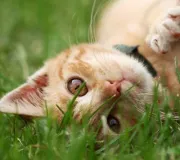There are some human foods you can give to your dog in small amounts, and then there are some that you should avoid at all costs. Find out about five of them here. For more information on harmful substances found in the home, see the article ‘Common Household Toxins‘.
Chocolate
Most dog owners know that chocolate is bad for their pets, but it can never be reiterated enough. Chocolate contains compounds called theobromine and theophylline, which are toxic to pets. Plus, chocolate contains caffeine, which isn’t good for animals either. Vomiting, diarrhea, or heart problems can result from ingesting too much chocolate. Secure it safely away in sealed containers.
Candy and Chewing Gum
Many candies and gums contain xylitol, an artificial sweetener that is very toxic to pets. Even small doses of xylitol can cause low blood sugar, liver problems, seizures, or worse for your dog. Do some research to find out about all the foods that contain xylitol, and be careful to keep them away from your pooch.
Grapes and Raisins
While some fruits make okay snacks for your pup, grapes are one of the exceptions. Grapes and their dried counterparts, raisins, are toxic to almost all dogs, although the reason is unclear. Don’t use them as a treat, and keep bunches of grapes or boxes of raisins off the kitchen table.
Alcohol
It may sound amusing to feed your pooch some of your alcoholic beverage and watch your pet get tipsy, but it’s really no laughing matter. Alcohol affects your dog the same way it affects you, but it’s much more dangerous. Lack of coordination, difficulty breathing, and coma or worse can result from alcohol.
Avocado
No matter how good you think the guacamole you just made is, don’t offer it to your dog. Avocados contain a substance called Persin, which is toxic to dogs and other animals, and could cause vomiting, diarrhea, and worse.
This is by no means a complete list of human foods that you should never give to your dog. For guidance on maintaining your pet’s health and preventing potential dangers, consider ‘Vet Preventive Care’ services. Talk to us, your local animal clinic in St. Lucie County, FL to find out about more hazardous foods.

